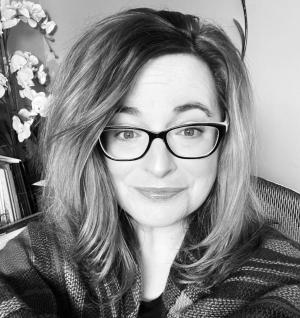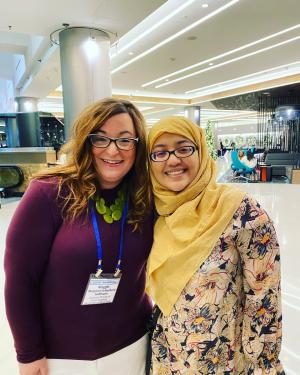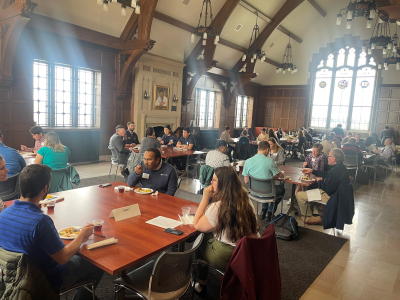HWW Team Spotlight: Associate Director of Career Diversity
On Building Inclusive Graduate Reform Efforts, Scalable Programming
Maggie Nettesheim-Hoffmann (@VileHistorian) is the Associate Director for Career Diversity at the Humanities Without Walls consortium. She is based at Marquette University in Milwaukee, Wisconsin.

Tell us about your role in Humanities Without Walls.
I was selected as one of the first national fellows for the Humanities Without Walls Career Diversity Workshop in 2017, and, being a PhD candidate in History, it was a genuinely transformative moment. I received the fellowship and said, “Oh my gosh, we need to bring these methods back to Marquette.” At the time, Marquette had limited external funding for graduate student success initiatives or career and professional development programming.
Following that workshop in 2017, I partnered with our graduate school to build out a model at Marquette that was based on the three-week HWW workshop which prioritized critical methods that would really resonate with a mission-oriented university like Marquette. We tailored those methods to the needs of not just our graduate students at the university, but also to the needs of our community in the city. We built a one-week model of the HWW workshop, focusing on Marquette's values and Jesuit tradition of discernment, and we opened it up to graduate students across the disciplines.
HWW took notice of what we were trying to build on our own, and in the fall of 2018, HWW leadership traveled up to Milwaukee for a career diversity symposium. That October, Dr. Antoinette Burton, HWW Principal Investigator and Director of the Humanities Research Institute at the University of Illinois Urbana Champaign, invited me to join the HWW team to help her build out the Chicago workshop in the summer of 2019. I was juggling trying to write my dissertation, which I'm still doing, and then also building the bootcamp at Marquette and building the HWW workshop. All of that led to Antoinette inviting me to participate in the HWW renewal grant project that we worked on in late 2019 and 2020. This work also had larger implications for Marquette which became an institutional member of HWW's consortium with the 2020 renewal and received a subaward to support my work on behalf of the consortium.
We asked ourselves: “How can we build career diversity programming across the consortium for other partner schools?” In my role as Associate Director for Career Diversity at HWW, I get to serve as a consultant to universities, including the University of Michigan, who hosted the workshop in 2022, and the University of Minnesota, who will host the workshop in 2023.
The other thing that I help guide and direct for the consortium is HWW’s faculty and staff Institutes. We piloted that model during the 2019 workshop, recognizing that the onus for graduate education shouldn't fall on the shoulders of graduate students themselves. We wanted to bring together committed individuals laboring in higher education spaces who have the power to make reform efforts. We wanted this group to think through ways to build sustainable, scalable programming at our universities that really baked in graduate doctoral education reform into what the universities offer. This model became a formal part of the renewal grant in 2020, and we hosted faculty and staff institutes in 2022 at Marquette, with participants from the University of Iowa and The Ohio State University. This year, we will be hosting it again in Milwaukee, welcoming participants to Marquette from Northwestern University and the University of Wisconsin at Madison.

Nusaiba Chowdhury, 2022 HWW Fellow
How has the career diversity workshop evolved over the years?
When the Chicago Humanities Festival was the partner for the HWW consortium, they laid out the framework for some important methods. Then, when I joined HWW, we began thinking about: “How do we give agency and empower graduate students themselves directly to design these reforms? What are the needs of graduate students?” which is a method that Antoinette has prioritized as our PI. She wants to include the voices of graduate students in whatever programming it is that we're developing. Graduate students are invited to participate in the design of the workshop itself and to lift off those cultural biases that are imposed on us in our departments to say, “You have agency in the construction of your careers.”
Another evolution of the workshop is that we really thought through how to include the voices of our workshop alumni in designing the annual workshop. As part of the renewal grant in 2020, each year we open a call inviting alumni to apply to serve on the advisory board where they review drafts of the workshop schedule. They share their experiences post-workshop in their own personal and professional development, and to help inform the workshop and that allows us keep a pulse on employment sectors.

Bootcamp 2022
Are there similarities between working with STEM and humanities graduate students?
Generally speaking, STEM students have more access to funding resources, but they are just as concerned about their career outcomes as we are in the humanities. It's a different type of concern because their funding is often directly connected with working in a lab on grant-funded, faculty-led projects. This funding model means that many can't leave their lab projects, so they don't get an opportunity to participate in additional experiential, innovative internship opportunities. They're limited in terms of the types of experiences that they can curate while they're in their programs.
For Marquette’s boot camp each year, two thirds of the students who sign up are from the STEM disciplines, and a third from the humanities or social sciences. Our one-week summer model gives them a chance to explore their options. Marquette bought in when I came to them and said, “[This experience] is not just for humanists. We're going to include all graduate students.” By making it as inclusive as possible, that's when the university starts to care and that benefits the humanities.
Based on national trends and career diversity, what is the future of humanities and graduate education reform? Where are we going in the next 5 years?
We're at a crossroads nationally that requires us to share our best practices, lessons and challenges in a way that helps us not just replicate the HWW experience but tailor it to universities [in a way] that's sustainable and scalable and connected to their mission. At Marquette, we've had to build most of our career diversity programming initiatives on internal dollars. I don't mean to be doom and gloom, but it offers an opportunity. We can learn from universities who haven't received external funding. From Marquette’s experience, you can do it for an affordable amount and with an eye toward providing quality programming on a limited basis. You don't need a $100,000 grant to start the reform efforts. No matter what you do, you're going to encounter the walls. But that doesn't mean we're not chipping away at it.